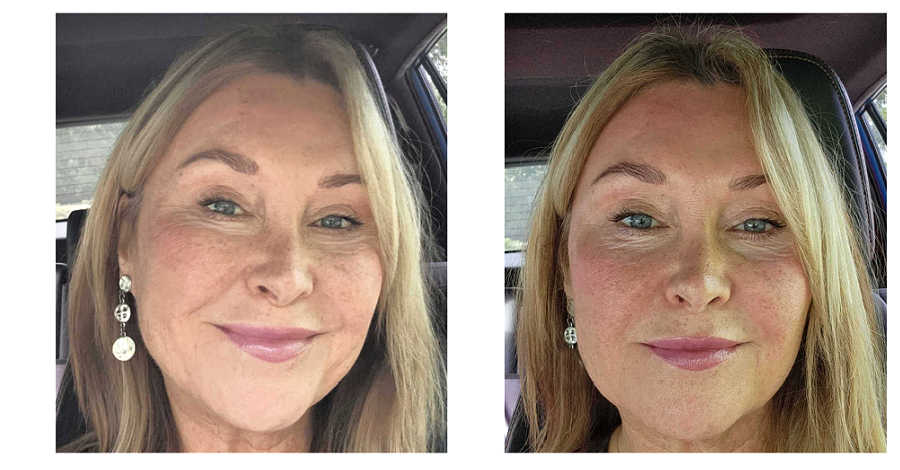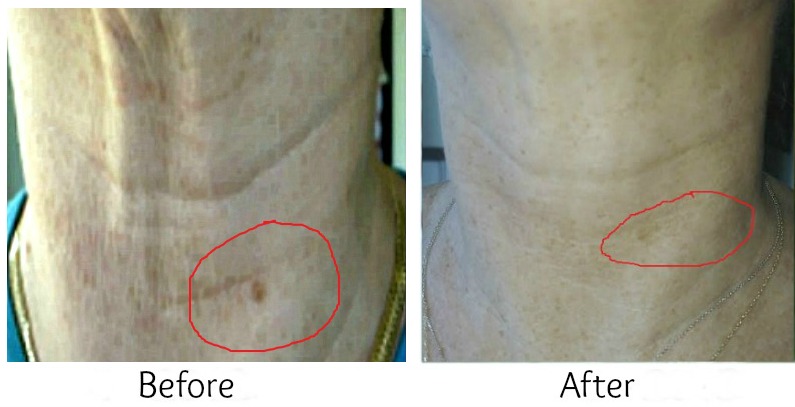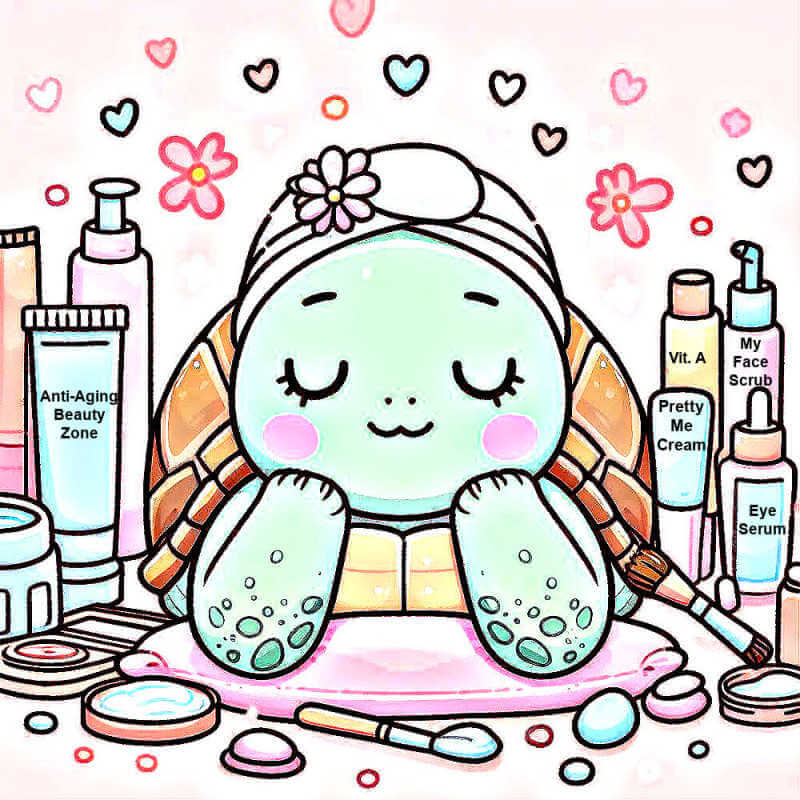I may earn from qualified Amazon & Affiliate purchases at no cost to you.
Is LifeCell Worth The Money?
by: Linda Robison / Facial Fitness Specialist @ ABZ
Let's review the pros, and cons and see whether it's worth the cost or not. Also, check out my before and after pictures.
Is Lifecell worth the money? Let's investigate the deal with this special cream that's got everyone talking.
Does it offer noticeable results that make the cost worthwhile? Well, it all comes down to your age, skin conditions, expectations and, of course, your budget.
Note: The company changed the name a while back to: LifeCell Ultra-Concentrated Clinical Skin Care. But now it's and back to LifeCell All-In-One. That's the one we're discussing here.
Pros and cons and complaints
The majority of customers who reviewed the cream said pretty much the same thing.
Pros:
- Worked well as a moisturizer
- Helped make their complexion look better instantly
- Helped reduce the look of wrinkles instantly
Cons:
- Worthless compare to the cost
- No changes
- When they stopped using it, the skin returned to its normal state
- Too expensive for just a moisturizer
- Caused breakouts
- Peeled or rolled off, especially when applying makeup or other products on top
- Too drying
- Issues with cancelling order and/or auto-renewals
What does LifeCell do for your skin?

According to the company's website and user testimonies posted
on multiple forums, the main benefits of this anti-aging cream include:
- The ability to "fill-in" fine lines and small wrinkles with what people describe as a putty or filler type consistency.
- It contains light reflecting ingredients (like mica) that causes a blurring effect of imperfections. The company says it provides instant results hiding fine lines, discoloration, and enlarged pores in about 17 seconds.
- It contains antioxidants and other anti-aging ingredients for long term anti-aging benefits.
- It provides a slight lift around the eye area and reduces puffiness.
- Provides intensive firming
- Under eye treatment for puffy eyes and circles
- Dark spot corrector
- Super hydration and moisturizing
Does LifeCell contain expensive ingredients like retinol?
For some reason, the exact formulation and ingredients of LifeCell varies, from different website. But, you can find the complete ingredient list here with a brief description of what each one does.
Here are some of the key active ingredients:
1. Retinol: To help stimulate collagen production, improve skin texture, and reduce the appearance of wrinkles.
2. Hyaluronic Acid: Helps hold a significant amount of water, providing intense moisture to the skin. It helps plump up the skin, reducing the appearance of fine lines and wrinkles.
3. DMAE (Dimethylaminoethanol): An antioxidant to improve skin firmness and elasticity. It is believed to have a tightening effect on the skin, reducing sagging and promoting a more lifted appearance.
4. Apple Stem Cell Extract: this is claimed to help improve skin's appearance.
5. Cermide 2: is fatty acid that is naturally found in the skin's barrier. It helps to keep the skin hydrated and protected from environmental damage.
6. Ubiquinone (Coenzyme Q10): Ubiquinone is a potent antioxidant that helps protect the skin from oxidative damage caused by free radicals. It can help improve the overall health and vitality of the skin.
7. Ascorbyl Palmitate (Vitamin C): This is a stable form of vitamin C that provides antioxidant protection and helps brighten the skin. It can also help stimulate collagen synthesis and improve skin tone.
8. Dithiolane-3-Pentanic Acid (D3PA): This is an antioxidant that aids in energy production within the skin cells. It helps improve circulation and can contribute to a more youthful and radiant complexion.
The active ingredients in this product are expensive and would cost a lot to buy separately. We don't know the exact amounts of each ingredient, but keep in mind that the ingredients lower on the list are present in smaller amounts.
Is Lifecell FDA approved?
No, LifeCell is not FDA approved.
The FDA does not provide approval for individual skincare products like LifeCell. They primarily regulate drugs, medical devices, and some cosmetic procedures.
However, when it comes to over-the-counter cosmetics they do oversee safety and labeling, rather than evaluating the effectiveness of specific products.
Therefore, while a skincare product like LifeCell may be on the market and compliant with FDA regulations, it does not mean it has been officially approved by the FDA for its claimed benefits or effectiveness.
However, their website states it is Dermatology tested and recommended.
Before and after pictures
I only tried it for a few weeks, but didn't really notice any difference. I had better results by using a separate vitamin C serum along with a moisturizer.
Personally, I don't think LifeCell has enough vitamin C to smooth-out my complexion and tone. I'm prone to freckling, so maintaining a spot-free complexion can be tough.
That's why I opt for a highly concentrated vitamin C serum in my daily routine. See below ...
 LifeCell Before and After.
LifeCell Before and After.If you're looking for better overall skin, personally, I'd use pure vitamin C moisturizer that I mix up fresh at home.
Over time, it can reduce dark spots, discoloration and help build collagen for a smoother, better textured skin.
Why use "blurring" ingredients to make pretend your skin is healthy - when you can get the real deal and improve your skin naturally.
That combined with a full spectrum CBD cream that actually bonds to your skin cell receptors and help improve and maintain good over-all skin health.
Look at my results below:
 Wrinkle reduction and skin tone improvement and clarity using CBD cream and vitamin C serum
Wrinkle reduction and skin tone improvement and clarity using CBD cream and vitamin C serumIf you're looking for something to reduce the look of dark circles and puffiness around the eyes, hands-down, there is nothing better (IMO) than the EES Eye Lift Serum. You can watch how it works on my friend's baggy eye problem here...
What does LifeCell cost?
A 2.54-ounce bottle cost about $189. Quite a hefty sum, right?
However, here's the twist. You're advised to use just a small amount (as per the company's website), and LifeCell claims to replace multiple facial products, such as moisturizers, anti-aging creams, lifting serums, dark eye circle erasers, and pore reducers.
Their pitch is that this might eventually save you money. But, once again, the choice of whether it's a worthy investment is up to you. If it works, it's worth it, right?
So, is Lifecell worth the money?
Different skin types have different needs, so whether LifeCell is worth the money depends on you.
It's possible that people with sensitive or dry skin love it because of its hydrating ingredients, while those who dislike it didn't use it according to the specific directions.
Want to try it without losing money? Here's a tip:
Before buying:
- Make sure they still offer a full refund option. Policies can change, so double-check.
- Be aware that the auto-renewal option may be automatically checked if you purchase LifeCell as a trial offer.
After buying:
- Save the receipt and remember the purchase date, so you don't miss the 30-day money-back guarantee.
- Try the product and if it doesn't work as expected, send it back within 30 days.
About the Author:
Linda Robison is a Facial Fitness Specialist and the founder of Anti-Aging Beauty Zone. She shares expert insights on skincare, facial rejuvenation, and beauty treatments—blending traditional wisdom, personal experience, and science-backed research for both at-home and in-office solutions.
Before you go ....
Please tap on the💙in the bottom right corner if you found this page helpful. Also, Let’s CONNECT! Click the buttons below to follow me on social media.
Thanks so much!

